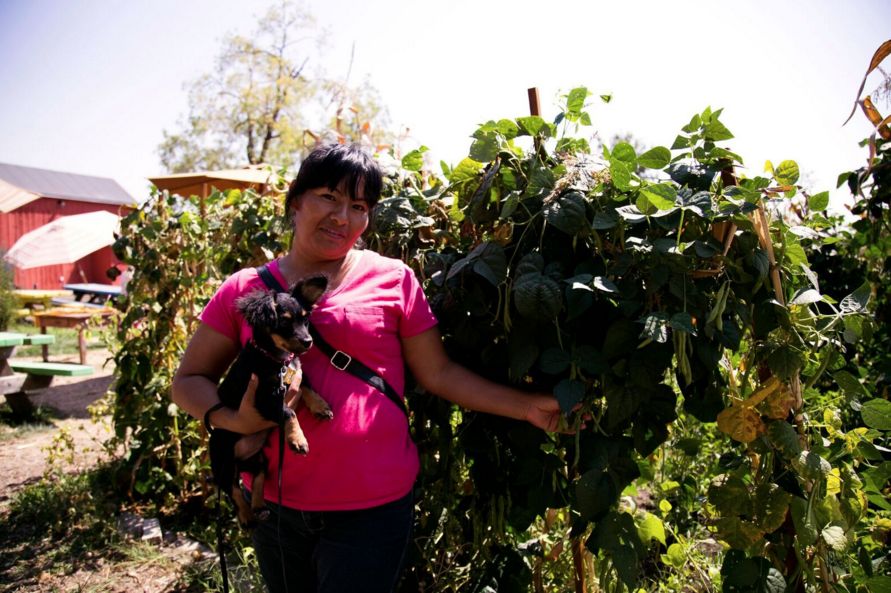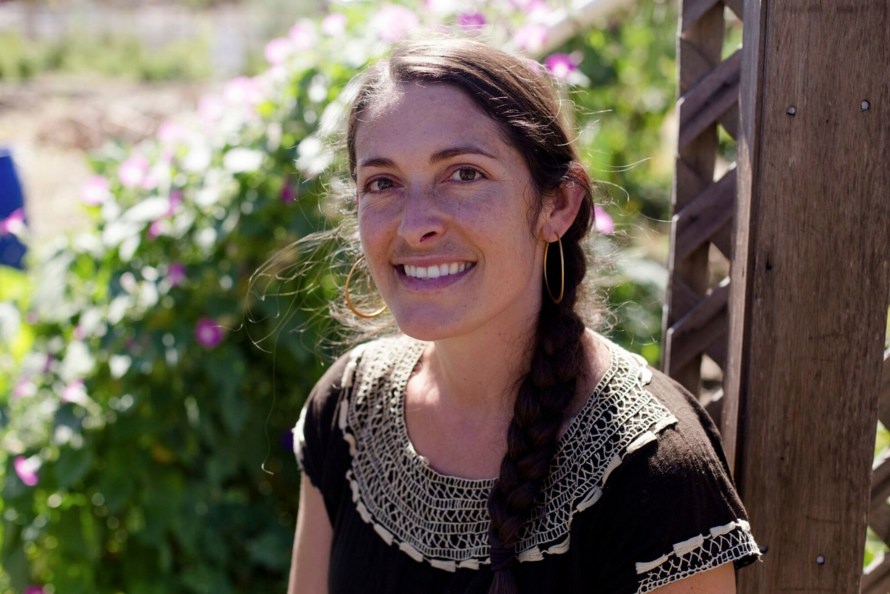Farming for Health empowers women in Roseland to cultivate plant medicine.
Guadalupe Vasquez used to go to the doctor’s office three times a month. Vasquez, 35, battles diabetes as well as liver and kidney problems. Her pain was so severe, she once fainted in the emergency room and had to be put on a morphine drip. Last February, fed up with feeling crummy, she joined the Farming for Health program at Bayer Farm—a six-acre urban garden and community park located in the heart of Sonoma County’s Roseland neighborhood—and has noticed a distinct improvement in her health.
“Lately I’ve been using droppers that help cleanse your liver and kidneys,” Vasquez says. “They’ve made a difference.”

86-year-old Doña(madam) Marina Gonzalez attends the Farming for Health meetings nearly every week. She’s benefited from allergy remedies and has become close with various members of the group. Many of them refer to her as the “Abuelita” (endearing term for grandma) of the group.
Farming for Health is a free program for Roseland residents that combines medicinal plants, herbs, and healthy eating tips to improve health through the cultivation of plant medicine and fresh produce. The program is open to anyone but consists mainly of local women. It all started two years ago when Angeles Quinones Bravo became interested in healthy eating. She would often visit Bayer Farm, where her husband Jonathan works as the farm manager. More often than not, she exchanged growing tips with owners of garden plots. The conversations sparked Bravo to coordinate a weekly gathering focused on bettering one’s health.
“Like the rest of the women, I started with the desire to learn, except I took a leadership role,” she says. “I am someone who’s learned along with the women in the program.”
Bravo spent time offsite learning about beneficial plants; she reserved a plot to grow herbs and medicinal plants. She then invited women from Roseland to join the group. They started with four members, and have grown to 13. The women learn together, experimenting with plants and teaching each other. The impact has been noticeable with more members integrating fruits and vegetables into their diets. “We stopped being as interested in carnitas and junk food,” Bravo says.
Shortly after launching Farming for Health, Bravo met Jocelyn Boreta who studied at The California Institute of Herbal Studies in Forestville. Together, they wanted to make plant medicine accessible to the people at Bayer Farm, which formed out of a unique partnership between Landpaths, a nonprofit with the mission to foster a love of land in Sonoma County, and Santa Rosa Recreation and Parks.
“You really only have to come here once to want to stay forever,” Boreta says. “My main goal was to help people feel like they can impact their own health.”
Boreta has taught the group which herbs are okay to eat straight away and how to process them into teas and tinctures. In one class, she explained how to find natural digestive support in artichoke leaves, which can help with sluggish digestion and liver support. Once the women tried them, attendance became fairly regular because the products worked for them and their families.
Boreta says she loves turning plants that grow like weeds into medicinal remedies. For instance, she showed the women how to make poppy tea, which is used to promote sleep, from the ubiquitous California poppies.
The most popular herbal remedies are the tinctures. Made up of fresh plant material from the garden, the herbs soak in alcohol for a month or so, and are then pressed for their medicinal properties.
“We made a liver tincture that had cleaver, dandelion, and artichoke leaf from the garden,” Boreta recalls. “We brought in some turmeric and ginger from the store and made a really nice tincture that is really supportive for digestion.”
Aside from plant medicine, the group also makes products for everyday use. Bravo teaches women how to make homemade ointments, creams, and deodorant. These items are available to members of the community on class days for a donation of just a few dollars, which goes toward supplies.
“We sell everything by donation,” Bravo says. “We don’t want people to just drop by to buy products, though. Our objective isn’t to sell anything. Our goal is to teach skills that can be passed down.”
Skills like these have helped Guadalupe Vasquez. Since Vasquez started the program, she has become very involved with the community garden at Bayer Farm and has her own plot. The program has helped her eat better and lose weight. Every morning, she takes the natural remedies she helped make with leaves from the garden. Best of all, the tinctures she’s learned to make have reduced her trips to the doctor’s office and her discomfort from diabetes. Vasquez still sees medical professionals, but the herbs have been a nice addition to her treatment.
“Since I’ve started using the tinctures, I haven’t been in as much pain,” she says.



Farming for Health is an example of good things when people take responsibility for their own lives! Take decisions and actions inspire all entire community!